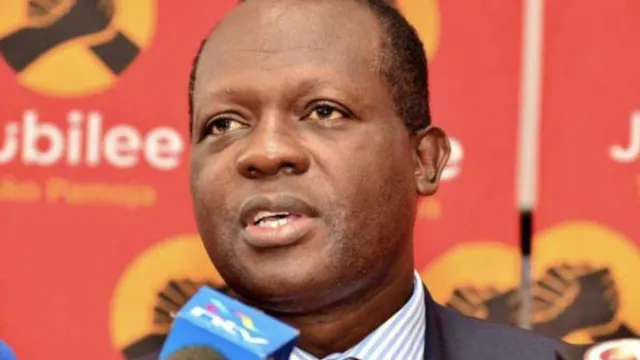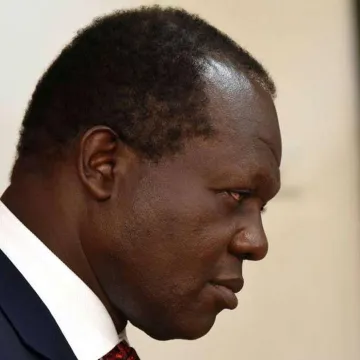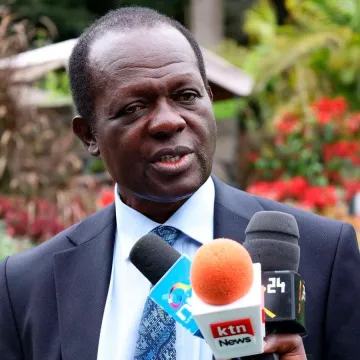Part 3: Tuju’s political playbook for escaping debt—how far will he go?

Former Jubilee Party Secretary-General Raphael Tuju.
In 1534, the celebrated English jurist Sir Thomas Moore, in A Dialogue of Comfort Against Tribulation, painted a vivid image of a drowning man grasping for “any port in a storm”—a timeless metaphor for the desperate clinging to any semblance of salvation. And from this, the modern phrase “clutching at straws” perfectly encapsulates this idea, symbolizing futile attempts to escape an inevitable fate.
Such is the case with Raphael Tuju, whose frantic maneuvers through convoluted litigation seem designed solely to sidestep his undeniable obligation to settle debt.
The Court of Appeal, cutting through the web of technicalities, offered a damning assessment: "At the end of it all, we think the appellant is merely hanging on technicalities in order to avoid his just obligations arising from the contract of guarantee."
The appellant in the case was Tuju, who had appealed a decision of the High Court enforcing the judgment of the UK in favour of the EADB. The appellate court dismissed Tuju's attempt to block the enforcement of the foreign judgment, paving the way for EADB to recover $9.3 million he borrowed from the bank, but which at the time had increased to $16.5 million (KES2.2 billion) owing to default.
Intimidating judges
Apart from relying on legal technicalities to avoid paying the loan (see Part 1: Game of legal chairs), Tuju has resorted to intimidating the courts and judges in a bid to influence them to rule in his favour. Two High Court judges have had to recuse themselves from the case, one citing undisclosed personal reasons, and another to protect the court's integrity.
However, in both schemes, Tuju has failed to avert the inevitable, namely, the enforcement of the judgment by the UK court, now recognised and to be enforced by the Kenyan courts. He is staring at the prospect of losing his multi-billion properties for refusing to pay a debt he had no reason not to pay.
To salvage his dwindling fortunes, Tuju has opened another battlefront, this time in the political arena, hoping this will spare him the fate that awaits him. Before delving into Tuju's political gimmicks, it is helpful to understand Tuju, the politician, and how power influences his behaviour as a politician.
Tuju first came to the national political limelight when he vied and won the Rarieda Constituency seat in the 2002 General Election. He was appointed as Minister for Information and Communication by President Mwai Kibaki's National Rainbow Coalition (Narc) government. At first, aligned to the Raila Odinga-led faction in Narc, Tuju survived the Cabinet purge in 2005 after the government lost in a constitutional referendum by aligning himself with President Kibaki.
He was appointed Minister for Foreign Affairs that year, as his political star shone bright. Having fallen out with Mr. Odinga, the political kingpin of Nyanza region where Rarieda is, Tuju lost his parliamentary seat in the controversial 2007 election. However, President Kibaki appointed him as his advisor on media and diversity issues. In 2012, Tuju quit his job to vie for the presidency unsuccessfully.
Jubilee Party Secretary-General
Tossed deep into Kenya's political cold, Tuju retreated from national politics until 2016 when he became Secretary-General of Jubilee Party, the political machine Mr Kenyatta assembled for his re-election bid in 2017. Upon re-election to a second presidential term, Mr Kenyatta appointed Tuju as a Cabinet Secretary without portfolio, marking his return to the power echelons.
At the time, Tuju and his children and companies had just defaulted on paying a loan advanced to them by EADB. But now, Tuju was powerful and in a position to intimidate anyone who stood in his way using the State. Just before the 2017 election, Tuju, as Secretary-General of Jubilee has launched an attack on the Judiciary, accusing it of leaning to the opposition, National Super Alliance (NASA).
Tuju wrote to then-Chief Justice Maraga demanding the removal of High Court Judge George Odunga from all cases involving the August 2017 elections. He accused the judge of being allied to NASA and related to a senior opposition politician. Tuju also sought to refer the matter to the Judicial Service Commission (JSC).
In February 2018, seven months after the disputed presidential elections of 2017, Tuju launched yet another attack on the Judiciary, accusing it of siding with the opposition. In a letter to Chief Justice Maraga, Tuju alluded to several cases the government perceived as showing 'open bias.'
Tuju was then the senior Luo politician in government, while his rival, Mr Odinga, was the leader of the opposition, which Tuju said was favoured by the courts. A month later, Mr Odinga and President Kenyatta buried the hatchet in the famous handshake of March 2018.
Meanwhile, Tuju's debt to EADB ballooned, as a result of refusal to heed persistent requests by the bank to settle the outstanding amount. Frustrated by Tuju's intransigence, EADB filed a suit in the UK to recover the monies owed and obtained a judgment in its favour. In February 2020, Justice Wilfrida Okwany of the High Court of Kenya ruled that the judgment was capable of being enforced in Kenya, overruling Tuju's objections.
But it was after EADB obtained the court's approval to place Dari Limited under receivership that Tuju, the politician, swung into full gear to frustrate the bank from rightfully recovering what it was legally owed. Sometime in April 2021, Tuju unleashed armed policemen and goons to prevent the receiver managers, Muniu Thoithi and George Weru, from accessing the plush Karen property charged to the bank under a debenture.
Drunk with power
Power corrupts absolutely, as the adage goes. Drunk with political power, Tuju escalated his campaign against EADB through manoeuvres in court designed to delay the legal process and discredit the Judiciary. He simultaneously abused State power to prevent court-sanctioned debt recovery measures against him.
That is why Tuju dares to manipulate the judicial system and blatantly disobey judicial orders with unsurpassed impunity. Regardless, the courts continue to grant him audience without him purging his contempt.
In 2022, Mr Odinga lost the presidential election despite receiving backing from the then incumbent, President Kenyatta. Tuju had played a frontline role in his erstwhile nemesis, Mr. Odinga's, campaign. Again, Tuju was unexpectedly thrown in the political cold where he remains today. He was stripped of political power and forced to wage his war against EADB through proxies, including parliamentarians and former employees of the regional bank, whom he has recruited to his corner.
Having lost all his cases from the UK courts to the courts in Kenya, Tuju is running out of cards. He has now waged a war against EADB's Board and Management in the Kenyan parliament and the East Africa Legislative Assembly (EALA).
In March 2023, Hon. Stephen Mule, MP for Matungulu Constituency, rose in the National Assembly on issues related to the case between Tuju and EADB, including querying the estimated KES350 million legal fees incurred by the regional lender that Tuju is likely to pay the bank if he loses. At the time, the case was pending before the Supreme Court.
Afterwards, Hon. Suleiman Shahbal, a Member of EALA, was quoted in the media threatening to raise the issue of how the case against Dari Limited was being handled. The two legislators were acting in their legislative capacity to meddle in matters that are strictly within the purview of the bank, not to mention cases pending in court. No one knows if Tuju's hand was behind the whole affair.
With defeat in the courts looming and facing the dire prospects of paying back the billions he owes, launching a political war against EADB is somewhat the last straw he can clutch to. With his political influence whittled since 2022, Tuju can only rely on the goodwill of his political friends to fight for his losing war.
He has also recruited two ex-EADB employees in his political theatrics. Both men have sworn affidavits against the bank and have been providing confidential information to Tuju, a matter now subject to investigations by Kenya's Directorate of Criminal Investigations (DCI).
For a man who once enjoyed unfettered access to State resources, including the police, whom he deployed without hesitation to frustrate his creditor, having to rely on others in his last-ditch bid to avert imminent debt recovery, searching for a port, any port, in his self-inflicted storm must be a humbling experience. Indeed, this is another story of how the mighty fall.
EPILOGUE
Raphael Tuju is a man running out of time and options in his ill-advised attempt to evade paying a debt he borrowed with no intention to pay. For now, he exploits legal technicalities to delay the inevitable.
His tactic of discrediting judges whose only fault is to interpret the law impartially is unabated but will undoubtedly be exhausted soon. His effort to recruit mouthpieces in the political arena will soon find few if any willing accomplices.
He cannot lean on State power and resources to bolster his private interests. It is only a matter of time before Raphael Tuju bows to the law.
Of greater concern is what the Tuju case portends for Kenya's future relationship with the EADB. Established in 1967, EADB has been at the forefront of fostering regional development by providing development finance.
The bank has weathered many challenges, including the collapse of the East African Community in 1977, emerging as one of the leading providers of long-term finance to enterprises in East Africa. It has an enviable track record of supporting capital projects in both public and private sectors.
Kenya has been a beneficiary of EADB support towards the country's development agenda. In 2021, Tuju filed a reference at the East African Court of Justice claiming the bank was in breach of its Charter by refusing, as he alleged, to disburse a balance of the loan, amounting to KES294 million, which he in a letter to the lender had stated was unnecessary.
This is a clear demonstration of the lengths to which Tuju will go to discredit the bank and tarnish Kenya's reputation as a member of the institution.
A quick online scan of media reports will reveal that only one debtor of EADB by the name Raphael Tuju and his company Dari Limited has dragged the bank into a constant negative presence in the media throughout East Africa.
One would wonder whether this is the only customer the bank has or what is so special about him that warrants his debt being placed above those of the people of East Africa whose money he has deliberately refused to repay.
Time will tell if Tuju has his way and the courts in Kenya and East Africa find him a victim of injustice or a recalcitrant borrower who will not honour his end of the bargain.
You can catch up with part 1 and part 2 of this captivating story





